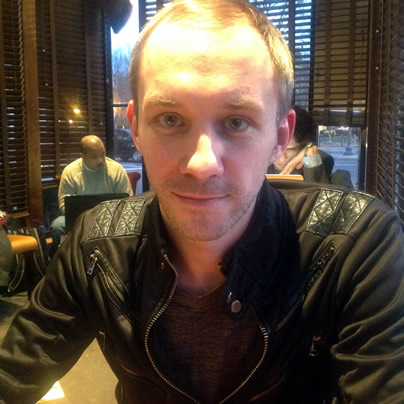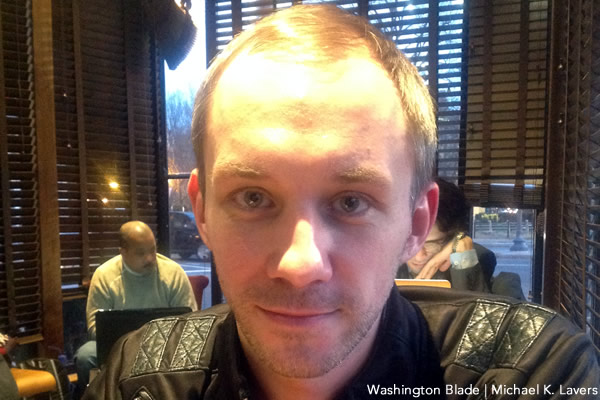National
EXCLUSIVE: Former manager of Russian gay nightclub to seek asylum in U.S.
‘I’m afraid … he’s making a dictatorship’

The former manager of a Russian gay nightclub that has been attacked several times over the last few months told the Washington Blade during an exclusive interview on Thursday he plans to seek asylum in the United States.
Arkady Gyngazov and three of his friends arrived in D.C. on Dec. 14 after flying from Moscow to New York the day before.
He told the Blade he has obtained a pro bono lawyer through Immigration Equality and the D.C. Center who agreed to take his case. Gyngazov has also worked with Larry Poltavtsev of Spectrum Human Rights, an organization that monitors the Kremlin’s LGBT rights record, since he arrived in the nation’s capital.
Gyngazov said he will formally seek asylum once his visa expires in June.
“I’m not going to go back to Russia because I feel my safety, even my life, is threatened,” he said.
Gyngazov was managing the Central Station nightclub in Moscow on Nov. 16 when two men whom security personnel refused to allow inside the establishment opened fire. None of the estimated 500 people who were inside the club during the incident were injured, but the assailants destroyed its surveillance camera and left bullet holes in the building’s facade.
An estimated 500 people evacuated Central Station on Nov. 23 after a group of assailants launched poisonous gas into the club. The Moscow Times reported roughly 100 people on Dec. 14 “dismantled” the roof of the building in which Central Station is located and either damaged or stole some of the club’s equipment that had been stored in the attic.
Gyngazov told the Blade during an interview from Moscow after the Nov. 16 incident the owners of the building placed a large neon sign above the club’s entrance the month before that reads “gay club here.” It also contains an arrow that points toward the door.
“I’m afraid because I don’t know what will happen tomorrow, what will happen to me,” he said on Thursday. “I’m not going to hide all my life.”
Gyngazov, 32, grew up in the Siberian city of Tomsk. He moved to Moscow in 2006.
Gyngazov is not out to his two younger siblings or his grandparents, even though he said he realized he was gay when he was a child. His parents are deceased.
He said life for LGBT Russians was “easier than now” in the 1990s under then-President Boris Yeltsin, in part, because his government was struggling to rebuild the country’s economy after the collapse of the Soviet Union.
Gyngazov told the Blade “he never thought” the Russian Duma would pass a bill that sought to ban gay propaganda to minors and that President Vladimir Putin would sign it into law.
“He’s making a dictatorship, like the Soviet Union two,” said Gyngazov.
Gyngazov said he recently read an article in a Russian newspaper in which government officials said the suicide bombers who killed 34 people in two separate bombings in Volgograd late last month targeted the city because the West has sought to export homosexuality to Russia. Authorities said two men tortured and killed Vladislav Tornovoi near Volgograd last May after he came out to them.
The Duma last month approved a sweeping amnesty bill that prompted the release of two members of the Russian punk band Pussy Riot who had been serving two-year prison sentences for staging a protest against Putin inside Moscow’s Christ the Savior Cathedral in 2012. Authorities in December also released a group of 30 Greenpeace members who had been in custody since they tried to board an oil rig in the Barents Sea in September and Russian billionaire Mikhail Khodorkovsky who was serving a 10-year prison sentence after his conviction on fraud charges in 2005.
Gyngazov told the Blade he thinks Putin granted amnesty to members of Pussy Riot, the Greenpeace members and Khodorkovsky because he wanted to temper criticism of his country’s human rights record ahead of the 2014 Winter Olympics that will take place next month in the Black Sea resort of Sochi. He said he remains fearful of what will happen to LGBT Russians once the games end.
“I’m afraid for my friends who stay there,” said Gyngazov. “When I talk to them, I can’t help them.”
State Department
State Department releases annual human rights report
Antony Blinken reiterates criticism of Uganda’s Anti-Homosexuality Act

Secretary of State Antony Blinken on Monday once again reiterated his criticism of Uganda’s Anti-Homosexuality Act upon release of the State Department’s annual human rights report.
“This year’s report also captures human rights abuses against members of vulnerable communities,” he told reporters. “In Afghanistan, the Taliban have limited work opportunities for women, shuttered institutions found educating girls, and increasing floggings for women and men accused of, quote, ‘immoral behavior,’ end quote. Uganda passed a draconian and discriminatory Anti-Homosexuality Act, threatening LGBTQI+ individuals with life imprisonment, even death, simply for being with the person they loved.”
Ugandan President Yoweri Museveni last May signed the law, which contains a death penalty provision for “aggravated homosexuality.”
The U.S. subsequently imposed visa restrictions on Ugandan officials and removed the country from a program that allows sub-Saharan African countries to trade duty-free with the U.S. The World Bank Group also announced the suspension of new loans to Uganda.
Uganda’s Constitutional Court earlier this month refused to “nullify the Anti-Homosexuality Act in its totality.” More than a dozen Ugandan LGBTQ activists have appealed the ruling.
Clare Byarugaba of Chapter Four Uganda, a Ugandan LGBTQ rights group, on Monday met with National Security Council Chief-of-Staff Curtis Ried. Jay Gilliam, the senior LGBTQI+ coordinator for the U.S. Agency for International Development, in February traveled to Uganda and met with LGBTQ activists who discussed the Anti-Homosexuality Act’s impact.
“LGBTQI+ activists reported police arrested numerous individuals on the basis of their sexual orientation or gender identity and subjected many to forced anal exams, a medically discredited practice with no evidentiary value that was considered a form of cruel, inhuman, and degrading treatment and could amount to torture,” reads the human rights report.
The report, among other things, also notes Ugandan human rights activists “reported numerous instances of state and non-state actor violence and harassment against LGBTQI+ persons and noted authorities did not adequately investigate the cases.”
Report highlights anti-LGBTQ crackdowns in Ghana, Hungary, Russia
Ghanaian lawmakers on Feb. 28 approved the Promotion of Proper Human Sexual Rights and Ghanaian Family Values Bill. The country’s president, Nana Akufo-Addo, has said he will not sign the measure until the Ghanaian Supreme Court rules on whether it is constitutional or not.
The human rights report notes “laws criminalizing consensual same-sex sexual conduct between adults” and “crimes involving violence or threats of violence targeting lesbian, gay, bisexual, transgender, queer or intersex persons” are among the “significant human rights issues” in Ghana.
The report documents Hungarian Prime Minister Viktor Orbán and members of his right-wing Fidesz party’s continued rhetoric against “gender ideology.” It also notes Russia’s ongoing crackdown against LGBTQ people that includes reports of “state actors committed violence against LGBTQI+ individuals based on their sexual orientation or gender identity, particularly in Chechnya.”
The report specifically notes Russian President Vladimir Putin on July 24 signed a law that bans “legal gender recognition, medical interventions aimed at changing the sex of a person, and gender-affirming care.” It also points out Papua New Guinea is among the countries in which consensual same-sex sexual relations remain criminalized.

The Cook Islands and Mauritius in decriminalized homosexuality in 2023.
The report notes the Namibia Supreme Court last May ruled the country must recognize same-sex marriages legally performed outside the country. The report also highlights the Indian Supreme Court’s ruling against marriage equality that it issued last October. (It later announced it would consider an appeal of the decision.)
Congress requires the State Department to release a human rights report each year.
The Biden-Harris administration in 2021 released a memorandum that committed the U.S. to promoting LGBTQ+ and intersex rights abroad.
The full report can be read here.
National
Same-sex couples vulnerable to adverse effects of climate change
Williams Institute report based on Census, federal agencies

A new report by the Williams Institute at the UCLA School of Law finds that same-sex couples are at greater risk of experiencing the adverse effects of climate change compared to different-sex couples.
LGBTQ people in same-sex couple households disproportionately live in coastal areas and cities and areas with poorer infrastructure and less access to resources, making them more vulnerable to climate hazards.
Using U.S. Census data and climate risk assessment data from NASA and the Federal Emergency Management Agency, researchers conducted a geographic analysis to assess the climate risk impacting same-sex couples. NASA’s risk assessment focuses on changes to meteorological patterns, infrastructure and built environment, and the presence of at-risk populations. FEMA’s assessment focuses on changes in the occurrence of severe weather events, accounting for at-risk populations, the availability of services, and access to resources.
Results show counties with a higher proportion of same-sex couples are, on average, at increased risk from environmental, infrastructure, and social vulnerabilities due to climate change.
“Given the disparate impact of climate change on LGBTQ populations, climate change policies, including disaster preparedness, response, and recovery plans, must address the specific needs and vulnerabilities facing LGBTQ people,” said study co-author Ari Shaw, senior fellow and director of international programs at the Williams Institute. “Policies should focus on mitigating discriminatory housing and urban development practices, making shelters safe spaces for LGBT people, and ensuring that relief aid reaches displaced LGBTQ individuals and families.”
“Factors underlying the geographic vulnerability are crucial to understanding why same-sex couples are threatened by climate change and whether the findings in our study apply to the broader LGBTQ population,” said study co-author Lindsay Mahowald, research data analyst at the Williams Institute. “More research is needed to examine how disparities in housing, employment, and health care among LGBT people compound the geographic vulnerabilities to climate change.”
Read the report
Federal Government
Lambda Legal praises Biden-Harris administration’s finalized Title IX regulations
New rules to take effect Aug. 1

The Biden-Harris administration’s revised Title IX policy “protects LGBTQ+ students from discrimination and other abuse,” Lambda Legal said in a statement praising the U.S. Department of Education’s issuance of the final rule on Friday.
Slated to take effect on Aug. 1, the new regulations constitute an expansion of the 1972 Title IX civil rights law, which prohibits sex-based discrimination in education programs that receive federal funding.
Pursuant to the U.S. Supreme Court’s ruling in the landmark 2020 Bostock v. Clayton County case, the department’s revised policy clarifies that discrimination on the basis of sexual orientation and gender identity constitutes sex-based discrimination as defined under the law.
“These regulations make it crystal clear that everyone can access schools that are safe, welcoming and that respect their rights,” Education Secretary Miguel Cardona said during a call with reporters on Thursday.
While the new rule does not provide guidance on whether schools must allow transgender students to play on sports teams corresponding with their gender identity to comply with Title IX, the question is addressed in a separate rule proposed by the agency in April.
The administration’s new policy also reverses some Trump-era Title IX rules governing how schools must respond to reports of sexual harassment and sexual assault, which were widely seen as imbalanced in favor of the accused.
Jennifer Klein, the director of the White House Gender Policy Council, said during Thursday’s call that the department sought to strike a balance with respect to these issues, “reaffirming our longstanding commitment to fundamental fairness.”
“We applaud the Biden administration’s action to rescind the legally unsound, cruel, and dangerous sexual harassment and assault rule of the previous administration,” Lambda Legal Nonbinary and Transgender Rights Project Director Sasha Buchert said in the group’s statement on Friday.
“Today’s rule instead appropriately underscores that Title IX’s civil rights protections clearly cover LGBTQ+ students, as well as survivors and pregnant and parenting students across race and gender identity,” she said. “Schools must be places where students can learn and thrive free of harassment, discrimination, and other abuse.”
-

 District of Columbia5 days ago
District of Columbia5 days agoNew D.C. LGBTQ+ bar Crush set to open April 19
-

 South America3 days ago
South America3 days agoDaniel Zamudio murderer’s parole request denied
-

 Maryland4 days ago
Maryland4 days agoMontgomery County police chief discusses arrest of trans student charged with planned school shooting
-

 Politics5 days ago
Politics5 days agoCourt records raise concerns about right-wing TikTok investor’s influence












